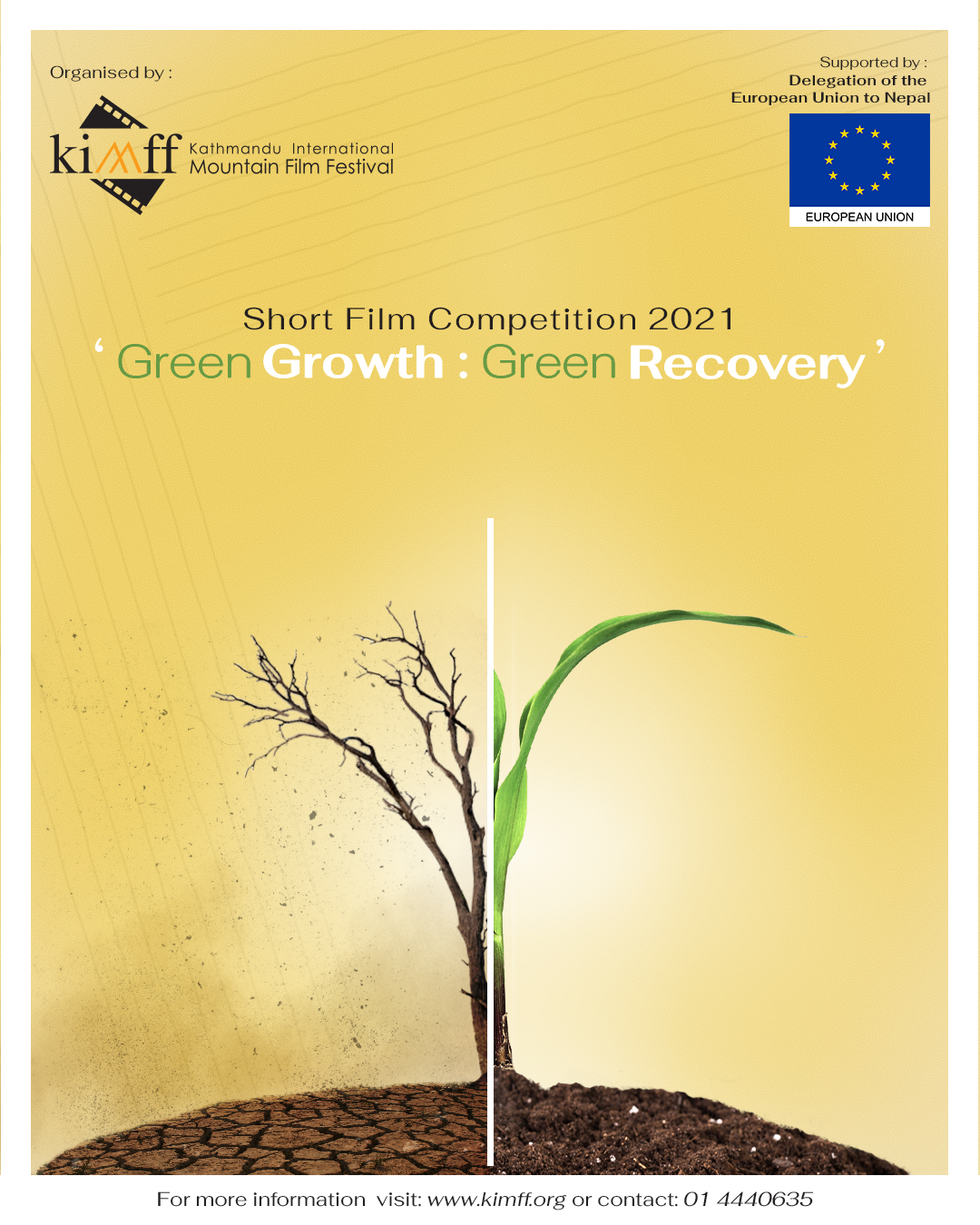
Details
Name:
Green Growth: Green Recovery
(Short Film Competition 2021)
Do you have a story? Have you experienced climate change? How does the environment relate to you?
Kathmandu International Mountain Film Festival (kimff) and Delegation of the European Union to Nepal (EU) invite entries to “Green Growth: Green Recovery,” a short film competition that tries to address these questions. We are looking for original and creative content that explores diverse perspectives, issues, opportunities and challenges of how the environment and climate change has impacted Nepal and Nepalis. As extreme climates, changing weather patterns and global debates around the environment, climate change and sustainability take centre stage, both locally and globally, we believe you should be part of this discussion.

First Place Short Film Competition
Blue Moon Turning Into Grey
dir. Samrat Dhungana
On June 15, 2021, the Marshyangdi floods displaced Taal village, one of the finest tourist spots in Manang district, washing away homes. Nikita, a grade 10 student now has to walk three hours from her home to the makeshift classrooms in tents. The broken computers, ruined classrooms, buried books and lost by climate change induced floods. They don’t know why this is happening. An older villager shares his experience about the Taal in his childhood and the Taal his children know. Fifty-nine households yet hundreds of painful stories. However, the villagers haven’t lost hope. They are rebuilding their lives.

Second Place Short Film Competition
Wildfire (Dadelo)
dir. Shyam Karki
A little red panda, a rare species, has become homeless as a result of unprecedented wildfires in the Nepali mid-hills, yet one more of a growing number of symptoms of the climate crisis that spares no human nor animal.

Third Place Short Film Competition
Climate Change in Himalayas
dir. Nabina Desar/ Rupesh Sah/ Nyima
The domentary explores the impact of climate change in a remote Himalayan community. It documents he testimonies and experiences of community members and the environmental changes they have witnessed. Local villagers speak about how irregular rain and snowfall have resulted in an alarming scarcity of drinking water and impacted natural resources like yarsa gumba. The youth are concerned that the authorities are not addressing the serious issue of climate change.
A Day in the Life of Dr. Sameer Mani Dixit
dir. Sailendra Dangol/ Sanish Shrestha
The film follows scientist Sameer Mani Dixit as he commutes to work on his bicycle. People regard the bicycle as a poor man’s ride but Dixit and other cyclists don’t think so. He has fun riding a bicycle and using the app-Greenway to monitor his contribution in saving the planet. Cycling keeps him mentally and physically fit, reduces his carbon footprint; it offers him a better view. The film encourages people to start small and from where you stand. Walking the talk rather than talking the talk.
Climate Change Changing Children
Dir. Annapurna Deokota
A little acknowledged fact I that children too are in the frontlines of climate change. The film tells the story from the perspective of children how the gradual scarcity of water is having an effect on their lives. We captured on film the lives of two young girls, Kushala and Kamala, as they try to balance their lives between the need to constantly gather water, and the need for their own space and time for educational, social, mental, and childhood pursuits.
Green Growth – Green Recovery
dir. Sambriddhi Rana
This short film focuses on the need to protect the environment and biodiversity. We are living in an age of urbanization and industrialization. Cleaning up the damage to our environment and preventing further destruction may seem like a monumental task. But it is possible to do so by changing our daily habits and working with others to spread awareness about the importance of Green Growth – Green Recovery, by managing waste, both biodegradable and non-biodegradable, by making compost from waste materials, and by following the 3Rs, i.e. Reduce, Reuse and Recycle.
Green Vertical Dreams
dir. Roja Rajkarnikar/ Subhawana Subba
Climate change is real and we are facing its wrath! Climate change has a direct impact on agriculture. Conventional farming alone cannot sustain food for us. And we believe that Hydroponics is one of the methods that could meet the rapid demands of food supply. Hydroponics has the potential to improve food security, reduce dependency on imported vegetables and fruits laden with high chemicals and pesticides, reduce the urban ecological footprint, build resilience to climate change and improve sustainability. Using our locally designed hydroponics system, we can grow up to ten times more vegetables compared to traditional farming, using 90% less water. Taking action today will secure food for tomorrow! The climate is changing, so when are we?
I am Hanumante
dir. Ananya Khadka
“I an Hanumante” personifies Hanumante River and portrays the river’s struggles, how it has witnessed many changes. The film tries to make people aware about why climate change is not one problem but is an amalgamation of many combined problems.
Regenerative Agriculture: An approach to combat climate
dir. Dikshyant Poudel
The film focuses on the aspect of zero economy and ways to minimize carbon emission by dumping it inside land through regenerative farming. Research has proved that the earth’s soil contains about 2,500 gigatons of carbon in the atmosphere and four times the amount stored in all living plants and animals. The most natural solution for this problem is the practice of regenerative farming at household level. The film features a 42-year-old women from Kathmandu who has been practicing regenerative farming as a way of improving land productivity and the environment.
Santhal
dir. Titikshya Dhakal
We have tries to show the impact of climate change on the indigenous Santhal tribe living in the southern plains of Nepal. The Santhal are mainly dependent on agriculture but untimely rains and changing weather patterns have affected their livelihood. The film looks at how climate change means uncertain futures for the younger generation.
